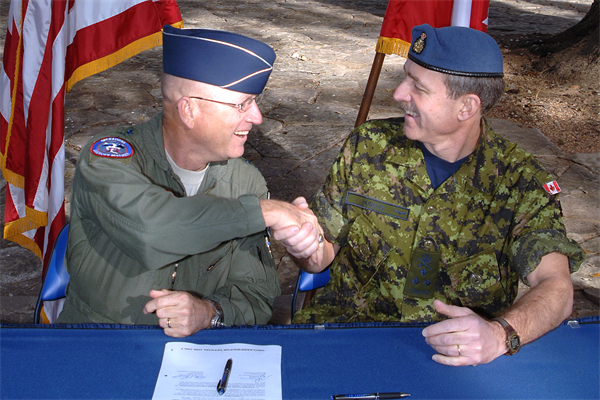Seven years ago today, Harper government tried to keep secret Canada-U.S. deal allowing each other’s troops to be deployed in civil emergencies

On February 14, 2008, Canada and the U.S. signed an agreement paving the way for the troops from either nation to be deployed across the border on the other nation’s soil during emergencies, but the Harper government did not want Canadians to know about it.
The Canadian public only came to know about the US-Canada Civil Assistance Plan (CAP), eight days later, on February 22, after a group of bloggers happened upon an a press release by the U.S. Northern Command.
The stated aim of the US-Canada Civil Assistance Plan (CAP) “is to provide a framework for the military of one nation to provide support to the military of the other nation while in the performance of civil support operations to the primary agency (e.g., floods, forest fires, hurricanes, earthquakes, and effects of a terrorist attack).” Furthermore, “When approved, military forces from one nation augment the other nation’s forces in civil support operations…”
A few months after the signing of the agreement, Canadian Air Force sent a team of search and rescue (SAR) technicians aboard two CC-130 Hercules aircraft deployed from 14 Wing, Greenwood, Nova Scotia and 17 Wing, Winnipeg, Manitoba, in preparation for the arrival of Hurricane Gustav in September 2008.
US Northern Command deployed 960 personnel in Canada during the 2010 Winter Olympics.
Justice Minister Peter MacKay championed its expansion in 2012, and believes that the process of sharing information should go even deeper.
“This has already been done to a certain degree, but there is still room for more integrated collaboration — domestically and bi-nationally,” MacKay said when the CAP was expanded 2012. “I think that we need to begin to consider partnerships from the ground up – from the local first responders to international organizations.”
What’s worrying many concerned Canadians more than the argument itself is the Harper governments attempts to veil it in a shroud of secrecy.
“It’s kind of a trend when it comes to issues of Canada-U.S. relations and contentious issues like military integration,” Stuart Trew, a researcher with the Council of Canadians said at the time. “We see that this government is reluctant to disclose information to Canadians that is readily available on American and Mexican websites.”
The CAP is not the only international agreement that Prime Minister Stephen Harper has been accused of trying to keep secret from Canadians.
Canadians only got to know about the controversial Trans-Pacific Partnership until it was leaked by the news media in Peru.
Prominent digital rights activist Michael Geist believes that the Harper Government wants to maintain secrecy precisely because there is something to hide.
“That kind of culture of secrecy runs counter to the basic ideals and values I would hope our government would hold when it’s my interest and everyone’s interests at stake,” he says.



